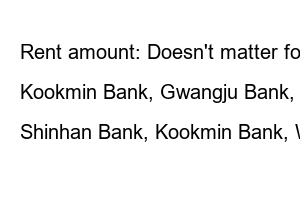1주택 전세자금대출SOCIAL NEWS PICK Loan Insurance Information
Since March 2, 2023, the Housing and Urban Guarantee Corporation (HUG) has allowed people with a home worth more than 900 million won and people with an annual income of more than 100 million won to guarantee a jeonse loan. I think this will be good news for those who own a home for investment purposes and need to live in a jeonse for reasons such as education or work. In this article, we will cover information on rental deposit loans for single-home owners. As the jeonse loan regulations have been relaxed, the threshold for using jeonse loan guarantees has been lowered. I will post what the relaxed regulations are and what regulations are still in effect, so I hope this will be helpful to those who want to use the jeonse deposit.
Even if I own house A, I can now take out a lease on house B. Previously, there were people who owned house A and had to live on a monthly rent as it was impossible to get a loan for rent. However, with the lifting of regulations, it has become possible to get a loan for rent.
On the other hand, there are conditions that are still being regulated. Those who own two homes cannot get a lease loan, and those who own a house worth more than 300 million won in Yongsan, Gangnam, Seocho, or Songpa are still unable to get a lease loan. The reason is that in order to prevent market instability such as expansion of gap investments, the guarantee limit for single homeowners is maintained for multiple homeowners and apartments exceeding 300 million won in speculative and transparent areas.
Please note that the information below may differ depending on the bank.
When getting a loan, whether you get it from Kakao, Woori Bank, or Shinhan Bank, the most commonly used guarantee is the Korea Housing Finance Corporation guarantee. In addition, we use Housing City Guarantee and Seoul Guarantee Insurance. The reason many people use Korea Housing Finance Corporation is because there is no pledge. If a lien is to be established, the consent of the lessor is required.
Setting up a pledge has the advantage of raising the loan limit, but it is highly likely that the landlord will not give consent because he or she is reluctant to do so. As soon as the landlord’s consent is entered and the pledge is established, the person paying the lease loan changes from me to the landlord. In other words, if I do not repay the jeonse loan, the landlord must repay the jeonse loan through subrogation.
Jeonse amount: KRW 700 million or less in the metropolitan area, KRW 500 million for other areas Loan limit: KRW 444 million for those without a home / KRW 224 million for those with one home → 80% of the deposit and reflecting debt within 4 times of annual income Possible loan limit: of the rental deposit 80% range Early repayment fee: None Prepayment setting: None Target housing: Apartments, residential office buildings, townhouses, single-family homes, multi-family homes, multi-family villas Loan qualifications: Not available to unemployed people without income / Available if the lessor is a corporation or foreigner
Jeonse amount: KRW 700 million or less in the metropolitan area, KRW 500 million for other areas Loan limit: KRW 400 million for non-homeowners / KRW 200 million for those with one home Loan limit: 80% of the rental deposit (90% for newlyweds and young households) Early repayment fee: None Settlement setting: Yes (Landlord’s consent required) Loan conditions: Applicable to the unemployed / Not possible if the landlord is a corporation or foreigner
Rent amount: Doesn’t matter for the apartment → For example, if I want to move into an apartment worth 800 million won, I should only use Seoul Guarantee Insurance. Target houses: Apartments, residential officetels, townhouses and multi-family villas Loan limit: KRW 500 million for non-homeowners / KRW 300 million for those who own one house Loan limit: 90 to 95% Early repayment fee: Yes Settlement: Yes (lessor’s consent required) Loan conditions: Landlord If this corporation or foreigner has no income, the income is converted and calculated based on health insurance premium payments and credit card usage.
It may be helpful to note that the available banks vary depending on the guarantee institution.
Kookmin Bank, Gwangju Bank, Industrial Bank of Korea, NH Nonghyup Bank, Daegu Bank, Suhyup Bank, Citi Bank, Hana Bank, Woori Bank, SC First Bank, Gyeongnam Bank, Busan Bank, Jeonbuk Bank, Jeju Bank, Korea Development Bank, K Bank, Kakao Bank, etc.
Shinhan Bank, Kookmin Bank, Woori Bank, NH Nonghyup Bank, Hana Bank, Busan Bank, Industrial Bank of Korea, etc.
Shinhan Bank, Kookmin Bank, Woori Bank, NH Nonghyup Bank, Hana Bank, Busan Bank, Industrial Bank of Korea, etc.

